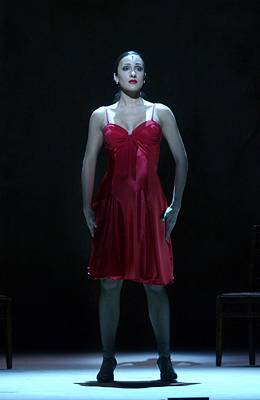|

Maria of hope or despair?
DAVID WILKINS was at the
first fully-staged UK production
of Piazzolla's 'Maria de Buenos Aires'
What harm do we do our dreams when we explain them? It's a question that might occupy one of the
many layers of Piazzolla and Horacio Ferrer's 'little tango opera', Maria de Buenos Aires.
It's also very relevant to the whole idea of giving this surrealist homage to a mysterious, and
inescapably localised, urban legend a definite set of references in what we call the 'real' world.

'Maria tango, Maria of the slums. Maria of the night and of fatal passion.' Julieta Anahi Frias in the title role of 'Maria de Buenos Aires' at the Theatre Royal, Norwich. Photo © Robbie Jack
|
Gidon Kremer very successfully toured, and then recorded, a concert performance. The musicians played on
stage, the singers and the narrating character of El Duende (as the Goblin -- the poet Ferrer
himself, no less) stood at lecterns and delivered their material. If you weren't suckled on the language
of the Argentinian capital you wouldn't have a clue what they were going-on about and even with decent
fluency in Spanish, you wouldn't be a lot wiser. The only movements were those small unsuppressible
instincts of a performer's body in thrall to the music's pulse. You could stare, amazed at the spectacle
of the accordion-like bandoneon and the beauty of the sounds his group produced, or you could close
your eyes and let a story of your own devising play out on the cyclorama of your mind. It didn't
matter -- the spirit and the pathos came across as it always will and the emotional impact was immense.
The Norfolk & Norwich Festival (along with those at Bath and Buxton) have been mighty brave in promoting
director John Abulafia's attempt to give the work a context -- to drape a story across Maria's shoulders.
The results are, of course, very different. The exquisite melancholy and the generalised empathy of the
Kremer version is replaced by an experience far more specifically harrowing. If Kremer leaves you sad,
Abulafia leaves you sad and appalled.
Continue >>
Copyright © 16 May 2004
David Wilkins, Eastbourne UK

|

